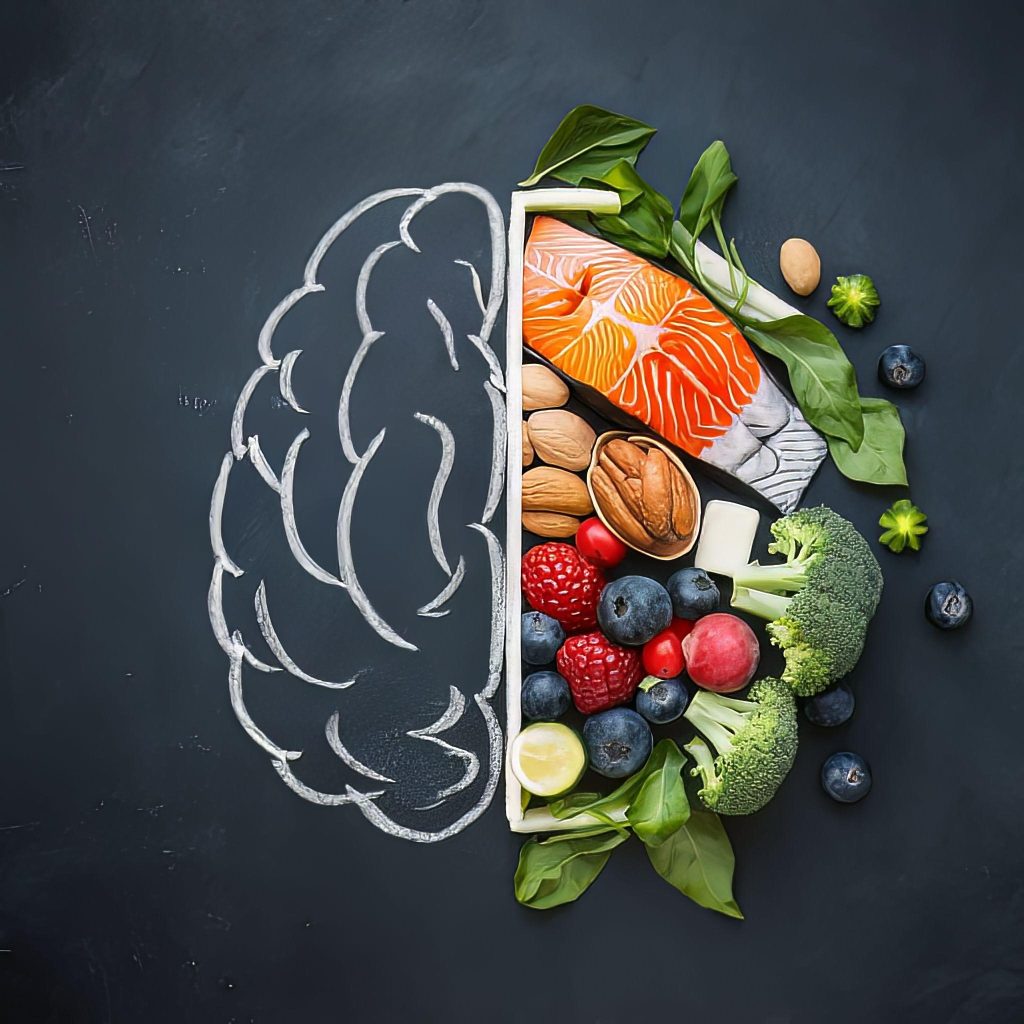WHAT TO EAT FOR A HEALTHY MIND?

ESSENTIAL FACTS:
- The connection between diet and mental health is gaining recognition, leading to more research in nutritional psychiatry.
- Nutrients such as iron, vitamins A, B, C, and D, omega-3 FAs, zinc, lithium, and magnesium have commendable effects on mental well-being.
- A reduction in the incidence of depression and suicide with a healthy eating pattern is studied profoundly.
- Dietary deficiencies, which are common in aged people, potentially lead to an increase in brain diseases.
- Research on the link between the brain-gut axis and psychiatric disorders has gained increasing attention in the recent past.
IMPORTANT FOODS FOR MENTAL HEALTH:
- Vitamins: Fruits, vegetables, whole grains, etc.
- Iron: Red meat, beans, dry fruits.
- Lithium: Potatoes, tomatoes, cabbage.
- Omega-3 fatty acids: Fish and flaxseed.
- Zinc: Meat and seafood.
- Magnesium: Green leafy vegetables, nuts, seeds.
NUTRITION FOR MENTAL HEALTH:
Many micronutrients have been directly evaluated and credited in the setting of brain functioning, regarded as psycho-protective nutrients:
- Glucose: The brain consumes more than 50% of dietary carbohydrates for energy. Regulating glycemia improves the quality and duration of intellectual performance in all age groups.
- Vitamin B1: This vitamin is essential in the brain tissue. It modulates cognitive performance by producing energy from glucose in the brain.
- Vitamin D: Replenishing it in the body through supplementation significantly reduces the severity of depression, irritability, fatigue, mood swings, sleep difficulties, weakness, and ability to concentrate.
- Vitamin B9: It is an essential nutrient that preserves memory during aging. Folic acid (vitamin B9) deficiency is associated with worsening symptoms in subjects undergoing antidepressant treatment.
- Vitamin B6: It is an effective treatment for premenstrual depression as it is directly involved in the synthesis of essential chemicals in the brain.
- Vitamin B12: In older people, it delays the onset of signs of dementia and improves cognitive functions. Adolescents who have a borderline level of vitamin B12 develop signs of cognitive decline.
- Iron: It is needed to ensure oxygenation, produce energy and synthesize essential brain chemicals. Iron deficiency is observed in children diagnosed with attention-deficit/hyperactivity disorder (ADHD).
- Lithium: It preserves the volume of brain structures involved in emotional regulation. A 2020 Study highlights the efficacy of lithium in bipolar disorder and depression.
- omega-3 fatty acids: Its dietary deficiency prevents the renewal of brain tissue and consequently accelerates cerebral aging. The implication in major depression and bipolar disorder is under evaluation.
- Magnesium: It is essential in driving all major metabolic processes in the brain, ensuring its optimal function and health.
- Zinc: Zinc deficiency is associated with the severity of depressive symptoms, and its supplementation, alongside antidepressants, contributes to mood stabilization.
- Tryptophan: This amino acid, a key protein component, supports and regulates brain function.
ANTIOXIDANTS FOR MENTAL HEALTH:
A 2014 study suggests that oxidative stress, i.e., Low blood levels of antioxidant vitamins, is involved in neurodegenerative disorders.
Vitamins A, C, and E are major antioxidants in foods. They are directly involved in protecting brain structures and functions. These substances are actively absorbed by brain cells and membranes, which is essential for their proper functioning.
A WORD FROM MENTAL NURTURING:
In the context of current changes, including changes in the food industry and changes in people's lifestyles and eating habits, the correlations between urbanization and its impact on mental state become essential. Previously, the impact of food on the brain's structure and function was not fully validated. Current research shows that mental health nutrition is gaining attention due to the connection between diet and well-being.
Essential nutrients—such as vitamins, minerals, essential amino acids, and essential fatty acids, including omega-3 polyunsaturated fatty acids—are recognized for their potential to protect and boost mental well-being. Knowledge of these correlations creates potential opportunities to implement mindful eating for emotional health and unlock the psychological benefits of foods.
RESOURCES:
1. Bourre JM. Effects of nutrients (in food) on the structure and function of the nervous system: update on dietary requirements for brain. Part 1: micronutrients. J Nutr Health Aging. 2006 Sep-Oct;10(5):377-85. PMID: 17066209.
2. Bourre JM. Effects of nutrients (in food) on the structure and function of the nervous system: update on dietary requirements for brain. Part 2 : macronutrients. J Nutr Health Aging. 2006 Sep-Oct;10(5):386-99. PMID: 17066210.
3. Grajek Mateusz , Krupa-Kotara Karolina , Białek-Dratwa Agnieszka , Sobczyk Karolina , Grot Martina , Kowalski Oskar , Staśkiewicz Wiktoria TITLE=Nutrition and mental health: A review of current knowledge about the impact of diet on mental health, JOURNAL=Frontiers in Nutrition, VOLUME=9, YEAR=2022
URL=https://www.frontiersin.org/journals/nutrition/articles/10.3389/fnut.2022.943998
4. Owen L, Corfe B. The role of diet and nutrition on mental health and wellbeing. Proceedings of the Nutrition Society. 2017;76(4):425-426. doi:10.1017/S0029665117001057
5. So Young Lim1, Eun Jin Kim1, Arang Kim1, Hee Jae Lee2, Hyun Jin Choi2, Soo Jin Yang. Clinical Nutrition Research 2016; 5(3): 143-152. DOI:
https://doi.org/10.7762/cnr.2016.5.3.143

Written by:
Dr.Saba Munir, MBBS
On January 13, 2025

